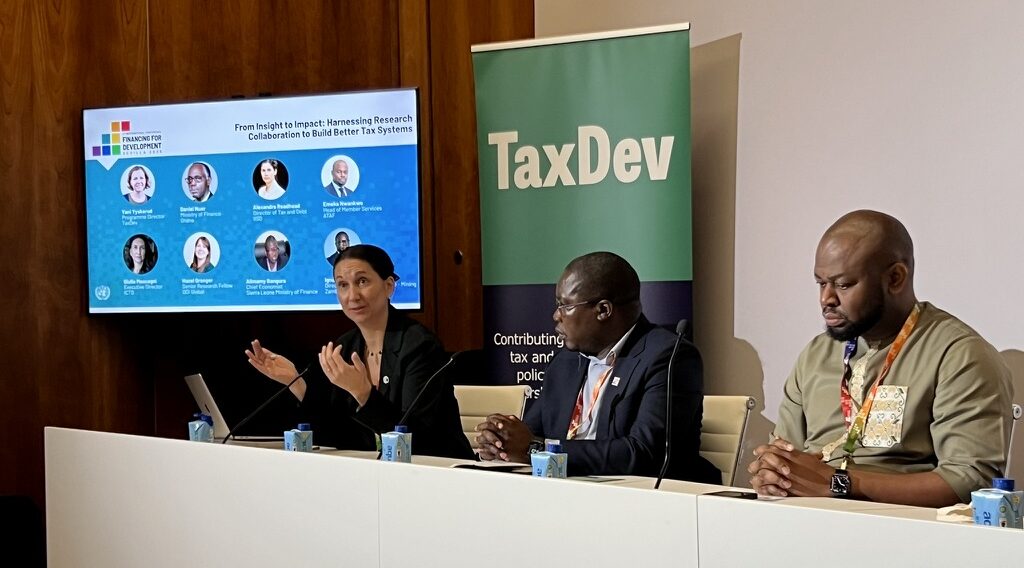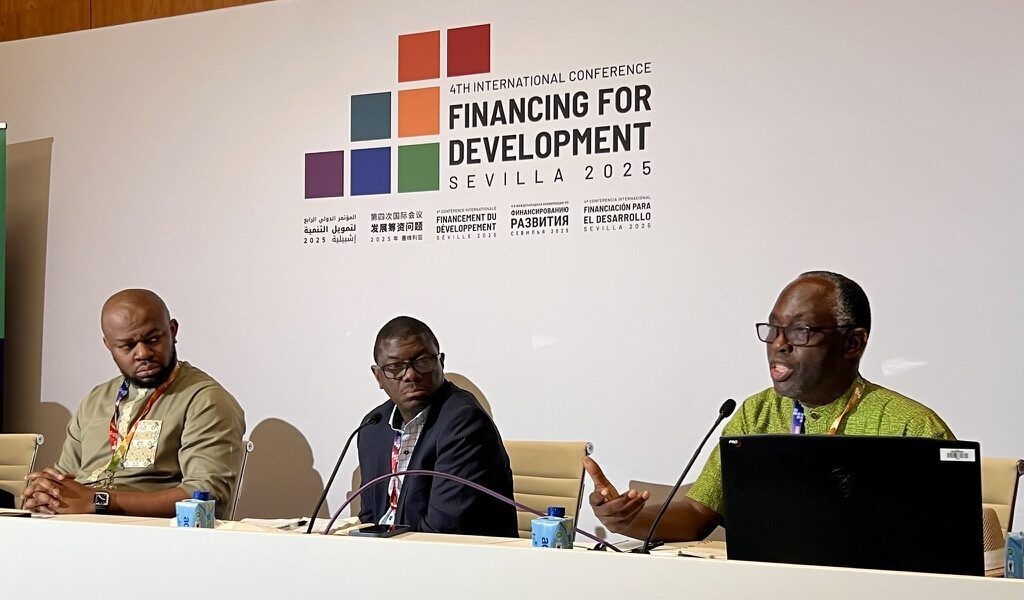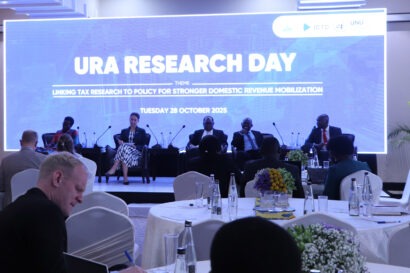Amidst growing fiscal pressures, rising debt service costs, and shrinking aid budgets, strengthening domestic resource mobilisation (DRM) has become an urgent priority for low-income countries. This imperative is reflected in the Compromiso de Sevilla, which calls for doubling investment in DRM as a foundation for sustainable development. Against this backdrop, a high-level side event – co-hosted by the ICTD, the TaxDev programme (Institute for Fiscal Studies and ODI Global), and the International Institute for Sustainable Development (IISD) – was held at the Fourth International Conference on Financing for Development (FfD4) in Seville.
The event showcased how collaborative, evidence-based approaches are helping countries build fairer, more effective tax systems. It brought together senior government officials from Ghana, Zambia, and Sierra Leone, along with regional and international experts, to discuss how research partnerships are delivering tangible outcomes in tax administration and policy, and how to scale this further.
Opening Reflections: Why Evidence Matters
Hazel Granger (TaxDev) opened the event by welcoming participants and introducing the first speaker, Louise Walker, Deputy Director at the UK’s Foreign, Commonwealth & Development Office. Walker highlighted the urgency of DRM and the importance of evidence-based tax reform, emphasising that raising more revenue is not just a technical challenge but a political one – requiring smart, context-specific choices grounded in strong evidence.
She drew on the UK’s long-standing support to the four co-hosting organisations to emphasise three core ingredients for successful tax reform: strong local ownership, long-term trusted partnerships, and evidence-informed policymaking. She noted that these elements not only improve revenue outcomes and equity, but also help strengthen the social contract. She called for continued investment in locally grounded research collaboration, highlighting its tangible impact and its potential to support more sustainable and accountable tax systems.
Research Partnerships in Action: How Collaboration is Driving Impact
The event’s joint presentation (below) – delivered by Yani Tyskerud (TaxDev), Alexandra Readhead (IISD), and Giulia Mascagni (ICTD), spotlighted concrete examples of how co-produced analysis has supported more effective tax policy and administration.
Distributional Analysis for More Equitable Tax Policies
Yani Tyskerud presented work by TaxDev with the Ministries of Finance in Ghana and Rwanda to embed distributional analysis into the policymaking process. In Ghana, the co-developed GHATAX microsimulation model allowed policymakers to assess the equity implications of different tax reforms, including a VAT rate increase that ultimately raised 3 billion cedis – predominantly from better-off households – while avoiding regressive spending cuts.
In Rwanda, distributional modelling helped policymakers understand the burden that inflation-driven ‘fiscal drag’ placed on lower-income earners. As a result, tax thresholds were increased, meaning over 130,000 formal low income workers were no longer subject to PAYE, with others seeing significant reductions in their tax burden. Reforms were staggered to mitigate revenue losses.
These examples demonstrate how tailored modelling can enhance the progressivity of tax systems, while also improving efficiency and safeguarding revenue performance. They also challenge common assumptions – such as the belief that VAT is inherently regressive – showing that with careful, context-specific analysis, countries can design reforms that deliver both equity and revenue gains.
Boosting Mining Revenues Through Data-Driven Audits
Alexandra Readhead described how IISD supported the Zambia Revenue Authority (ZRA) to conduct transfer pricing risk assessments in the copper mining sector. Through benchmarking analysis and collaboration with the Ministry of Mines, ZRA identified pricing distortions in sales to related parties – such as under-reported metal content and manipulation of contract terms.
Armed with this data, the ZRA launched targeted audits, recovering an additional USD 58 million in CIT between 2020 and 2022. Ongoing audits continue to identify further liabilities. The project also helped refine the use of Zambia’s “sixth method” for pricing exports, and has informed policy changes to close loopholes and improve transparency.
With global demand for critical minerals rising due to the energy transition, it is increasingly important that resource-rich countries receive fair prices for their exports. IISD’s work in Zambia is part of a broader effort to help countries improve pricing mechanisms and close revenue gaps. For example, in 2024, Guinea introduced a safe harbour for bauxite sales after IISD analysis showed it was losing USD 200 million annually due to underpricing.
Rethinking Taxpayer Registration Strategies
Giulia Mascagni presented research, conducted in partnership with the Rwanda Revenue Authority (RRA), into the issue of “nil-filers” – taxpayers who declare zero income and pay no tax. In Rwanda, mass registration campaigns had led to bloated taxpayer rolls with little revenue gain.
Through surveys and experimental research, ICTD found that many small businesses registered prematurely or unnecessarily. In 2024, the RRA de-registered around 40,000 nil-filers, improving efficiency without reducing revenue. The move also enhanced trust and satisfaction with the RRA as a more service-oriented and responsive institution.
The findings have prompted similar reforms in other countries. In Sierra Leone, ICTD’s research with the National Revenue Authority found that nearly a third of newly registered taxpayers were below the tax threshold, leading to a shift in registration strategy. In Uganda, ICTD’s work with the Uganda Revenue Authority prompted a pause and review of its registration campaign after findings showed that many new registrations were not generating revenue – helping avoid inflated taxpayer rolls and unnecessary administrative costs.
Insights from Policymakers: Evidence in Practice
The panel discussion featured high-level officials reflecting on their countries’ experiences and priorities.
Daniel Nuer (Ghana Ministry of Finance) highlighted how distributional evidence from GHATAX had improved the ministry’s ability to evaluate the fairness and fiscal impacts of proposed reforms. He described how evidence is now more deeply integrated into the policy process through collaboration with the Ghana Revenue Authority and other departments and ministries. He also highlighted how effective communication of analysis can also sometimes create more political space for reforms.

Ignatius Mvula (Zambia Revenue Authority) discussed how the Mineral Output Statistical Evaluation System (MOSES) has enhanced Zambia’s ability to detect and address tax avoidance in the mining sector. Developed in partnership with the Ministry of Mines, MOSES tracks mineral production and export volumes in real time, helping identify discrepancies, verify declarations, and strengthen enforcement. The system supports cross-agency coordination and has become a critical tool in identifying risk areas and improving compliance. Mvula underscored the importance of inter-agency collaboration and having the right data at the right time, which has translated directly into higher revenues from the mining sector.
Alimamy Bangura (Sierra Leone Ministry of Finance) shared three examples of how research has directly shaped tax policy and administration in Sierra Leone:
- Tobacco Taxation: In 2018, Sierra Leone increased its excise duty on tobacco to align more closely with WHO recommendations. While there were initial concerns that this might fuel smuggling – given the country’s porous borders – customs data analysis showed otherwise. Revenue from tobacco excise more than doubled in real terms, smoking prevalence declined, and smuggling actually fell, supported by complementary enforcement measures.
- High-Net-Worth Individuals: A 2021 joint study by the National Revenue Authority and ICTD explored how Sierra Leone could better enforce tax compliance among the wealthy. Despite early limitations in administrative data, the research demonstrated that the legal tools were already in place. It flagged large importers posing as small traders and identified landlords for targeted compliance follow-up.
- Subnational Revenue Reform: ICTD supported a property tax reform in Freetown, which helped triple revenues and made the system more progressive. This successful model is now being expanded to other cities, including Kenema and Makeni.
Emeka Nwankwo (African Tax Administration Forum) brought a regional perspective, noting strong demand across African revenue administrations for support in building tax research capacity. He praised growing peer learning and South-South exchange, while calling for more investment in data and analytical capacity to produce context-specific research. He noted the need for more evidence on informal sector taxation, tax incentives, the taxation of high-net-worth individuals, and the drivers of tax-to-GDP ratios, and reaffirmed the importance of aligning evidence with political will and administrative capacity.

Looking Ahead: Scaling What Works
Wrapping up the event, panel moderator Giulia Mascagni (ICTD) reflected on the breadth of insights shared and emphasised the momentum behind research-driven tax reform. She emphasised that research plays a vital role in helping policymakers evaluate trade-offs, especially in contexts with limited capacity. Evidence, she noted, enables more intentional decision-making and supports better sequencing of reforms—ensuring that changes are both feasible and impactful.
Mascagni called on governments to expand investment in demand-led research partnerships that are rooted in local priorities and long-term engagement. Such partnerships, she stressed, are essential for building tax systems that are not only more equitable and efficient, but also capable of earning and sustaining public trust.
As Louise Walker highlighted at the outset, “This is exactly the kind of impact we are looking for.” At a time when development finance is under strain, taxing smarter – through evidence, collaboration, and political insight – offers a scalable and sustainable path forward.



